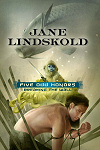I've recently read three fantasy novels that really show what a diverse spread that term covers, because these books have very little in common except that they'd all have a little unicorn on the spine in my childhood library.
 S.M. Stirling
S.M. Stirling's
The Sword Of The Lady
is the latest in his saga about The Change, a magical moment when most techonology ceased to exist. The first three books covered the efforts to survive without most of modern conveniences, such as transport and refrigeration and all the other stuff that brings food to us. Now he's jumped ahead about twenty years to the kids who grew up in the new world, who find old people a bit quaint when they reminisce about the old days and stuff that doesn't work any more. Modern kids believe in magic and honor and sword-brothers, and in acting instead of thinking about what it means to want to do things. Stirling moves around a lot, showing his main characters as they fight their way across North America, but also cutting across to see what their mysterious enemies are up to, or what politics are like back home in Oregon. There is lots of sword fighting, with blood and guts, and lots of details about how things are done and the new way of approaching life that the Changelings have. Good fun, although a bit repetitive after five books of it. B-

Then I read
Five Odd Honors
, the third Breaking the Wall book by
Jane Lindskold. This is more urban fantasy -- the magic takes place in San Francisco (well, Silicon Valley, really), and the main characters drive to their warehouse where they built the magic gate to another world. The magic has strict rules, although this book does address the idea of different kinds of magic and each has their own theories and techniques. The characters juggle work and careers and college educations (some are young, some retired, others in between; a few are from that other world) in between studying the magic system that provides defense against an unknown opponent. B+
 Jo Walton'
Jo Walton's
Lifelode
takes place somewhere else, in a place where time moves differently depending on which direction you travel in, where a typical seeming medieval village has vastly different social mores and expectations, where magic is commonplace in one town but almost disappears if you go East enough. Walton never explains anything but lets her characters and situations slowly reveal what is going on, what has happened, and what this society values and expects. Her book is the most literary, with a complex interweave of tenses that slowly reveal the plot through flashbacks and different framing situations. A-
All the books were fun, but Walton's book sticks to your soul after you read it, while Stirling's book stays inside its covers; Lindskold's characters ring more true but the emphasis still seems on what the characters do, not who the characters are and how they resonate with how humanity believes in itself and changes itself through that belief.
 S.M. Stirling's The Sword Of The Lady
S.M. Stirling's The Sword Of The Lady , the third Breaking the Wall book by Jane Lindskold. This is more urban fantasy -- the magic takes place in San Francisco (well, Silicon Valley, really), and the main characters drive to their warehouse where they built the magic gate to another world. The magic has strict rules, although this book does address the idea of different kinds of magic and each has their own theories and techniques. The characters juggle work and careers and college educations (some are young, some retired, others in between; a few are from that other world) in between studying the magic system that provides defense against an unknown opponent. B+
, the third Breaking the Wall book by Jane Lindskold. This is more urban fantasy -- the magic takes place in San Francisco (well, Silicon Valley, really), and the main characters drive to their warehouse where they built the magic gate to another world. The magic has strict rules, although this book does address the idea of different kinds of magic and each has their own theories and techniques. The characters juggle work and careers and college educations (some are young, some retired, others in between; a few are from that other world) in between studying the magic system that provides defense against an unknown opponent. B+ Jo Walton's Lifelode
Jo Walton's Lifelode
2 comments:
I couldn't really give Sword of the Lady more than a gentleman's C. Too much supernatural stuff, less cool action.
I think it benefitted from my low expectations.
Post a Comment